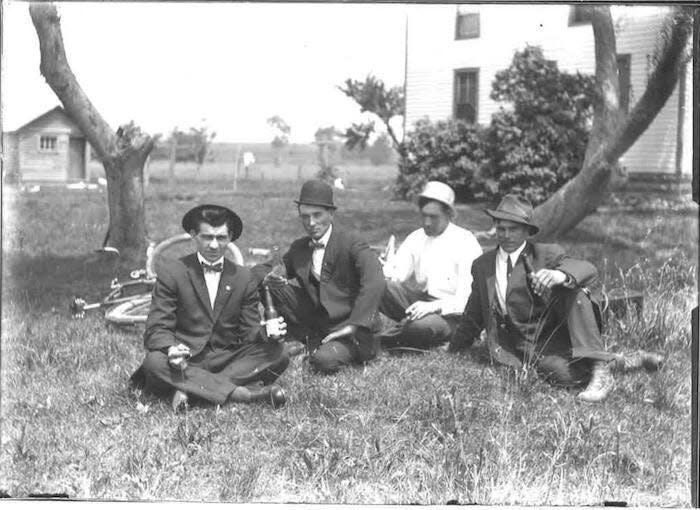Steve VanderVeen: With saloons aplenty, the adventurous and fire-chasing Bloms thrived
The Bloms led adventurous lives, dodging temperance and chasing fires.
Cornelius Blom Sr. was born in 1844 in Zeeland, The Netherlands. He married Jannetje Mieras in 1865. They had eight children, including Cornelius Blom Jr. — born in 1866 — plus David in 1869 and Will in 1877.
More History: Holland founder was a 'social entrepreneur'
More History: Holland's first mayor excelled at management
More History: 'The Dealmaker' of Holland, Part II
When Albertus Van Raalte founded Holland, he forbade the sale of strong drink, though he later allowed it for medicinal purposes. Beer, however, was a different matter.
Initially, the Hollanders imported beer. Then, in 1863, John Aling opened a brewery that produced about 450 barrels of beer annually. The Great Fire of 1871 destroyed it.
Two years later, Carl Zeeb opened a brewery at the corner of Tenth Street and Maple Avenue. At that time, brewers distributed beer in barrels to households and saloons.

In 1870, Cornelius Blom Sr. was a saloon keeper. In 1883, he owned the Rose Bud Saloon at 15 River Ave. He was also a city constable, watching prisoners before they were transported to Grand Haven.
As a saloon keeper, Blom had to be careful, for saloons were the target of the temperance movement, which was gaining ground in Holland. In fact, its strongest supporters were Holland’s first mayor, Isaac Cappon, and his wife, Catrina De Boe Cappon.
In 1873, the city assessed fees of either $25 or $75 on its nine saloons. In 1877, the city increased those fees. In 1881, the city forced saloons to close on the Fourth of July, their busiest day. During those years, as a result of the political tug of war between the “wets” and “drys,” the number of saloons fluctuated between seven and 16.
In 1884, at the age of 18, Cornelius Blom Jr. began his long service as a Holland firefighter. In addition, in 1885, he worked at Blom’s Confectionary at 18 W. Eighth St.
There, he served milkshakes from an onyx soda fountain, no doubt with a twinkle in his eye. Back then, a milkshake referred to an eggnog-like drink made of eggs and whiskey. But Blom was ahead of his time.
In his book, "Holland, Michigan," Robert Swierenga wrote: “To make the shakes, two glasses of ice-cold milk and vanilla flavoring were fastened to a fast-moving teeter-tottering device that was spun by a wheel with a hand crank. This created a shaking movement that mixed the flavoring and left a head of frothy foam.”

Next to the machine was a giant felt elephant with a clock mechanism that made the elephant’s head nod. To promote his drink, Blom claimed his five-cent milkshake was “one step closer to temperance."
But in reality, temperance was one step closer. In 1890, the state legislature passed a law that gave local districts the option to prohibit the manufacturing, distributing and selling of alcoholic beverages. Holland assessed saloons $250. Although Holland did not vote to go “dry,” Zeeland did, and remained so for the next century.
Subscribe: Learn more about our latest subscription offers!
By 1890, Cornelius Blom, Sr. was among Holland’s elite. He was an investor in the Ottawa Furniture Company, formerly Werkman Agricultural Works, and he was one of four beer bottlers in Holland.
At his River City Bottling Works, Blom bottled 75 cases of Toledo Beer a day, some of which was delivered to customers in their homes, the rest sold in saloons.
Blom was also selling beer in saloons. From 1901 to 1903, he co-owned the Blom and VanZee Saloon at 6 W. Eighth Street. From 1901 to 1906, he also ran the Blom, Sr. Saloon at 174 River Ave.
David, his son, was also in the business. From 1897 to 1898, he owned the Blom Saloon at 164 River Ave. — and from 1902 to 1903, he owned the Blom and Bartusch Saloon at that same address.
Then, in 1908, Holland forbade the consumption of alcohol in saloons, which led to the practice of patrons purchasing bottled beer and consuming it outside, a practice the locals called “counting the stars.”
The Bloms survived. From 1908 to 1911, Cornelius, Sr. owned the White Seal Saloon at 174 River Ave. — and from 1910 to 1911, David owned the Blom and Hosteen Saloon at 5 W. Eighth St. Four years later, David owned the Blom Saloon at the same address.
Another son, Will, operated the Blom Saloon from 1915 to 1916.
Cornelius Blom, Sr. died in 1918. The Volstead Act, which prohibited the making and selling of alcoholic beverages, became national law in 1920.
— Community Columnist Steve VanderVeen is a resident of Holland. Contact him through start-upacademeinc.com.
This article originally appeared on The Holland Sentinel: The adventurous and fire-chasing Bloms of Holland, Michigan
